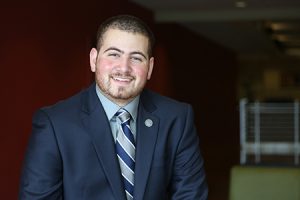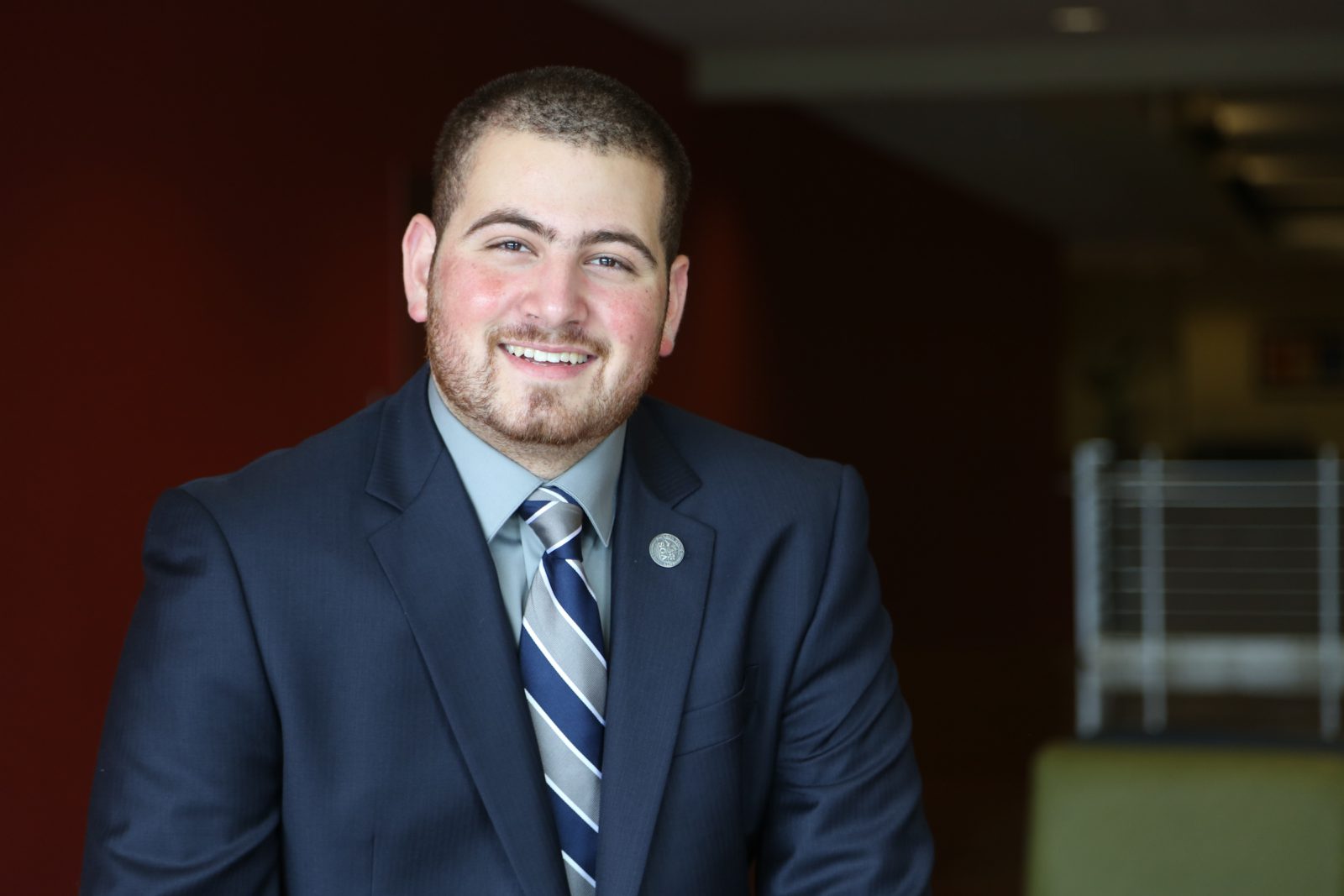Bombs and gunfire are part of daily life in the Gaza Strip, which is the reason Anas Alfarra was so desperate to flee. His admission at age 17 into a competitive exchange program managed by the U.S. State Department’s Bureau of Educational and Cultural Affairs was to be the first in a series of “blessings” leading to his May 4 graduation ceremony at Jackson State University.

Alfarra lived in Egypt and Saudi Arabia before his family settled in the Gaza Strip, a 25-mile long sliver of land along the Mediterranean Sea. There, conflict is commonplace and has been for centuries. Through art, Alfarra found solace from the war and a way to earn income for his family.
“As a 16-year-old, I started a business to recycle the torn down trees from the war and make lamps out of them to sell. They symbolized that from the destruction, I am sending out light,” he said. “I was trying to find any way to get outside of Gaza because I figured this was not the place for me after I faced death in the streets and at the academy.”
He applied for the Near East and South Asia Undergraduate Exchange Program, a part of the Global Undergraduate Exchange Program. NESA is for emerging student leaders from underrepresented sectors around the world, according to the program’s website. It provides an exchange experience at a U.S. college or university for students from the Middle East, North Africa and South Asia.
“I was the first one to come from Gaza on the scholarship. I was chosen from a lot of applicants. I had to be at least 18. I was only 17, but I received an exception,” Alfarra said. “We serve as cultural ambassadors. We build bridges of mutual understanding between my country and America. When people see that I’m a Muslim and an Arab from the Middle East and that I’m a successful, normal person, this opens a dialogue to give others a different perspective of Middle Eastern and Arab people.”
When Alfarra arrived at JSU in August 2009, he fell in love with the historically black university, so much so that he didn’t want to leave.
“I never would have thought I would experience this much care, love and respect from the people here. Jackson State has been another home for me,” Alfarra said. “People were concerned about me. They opened their houses to me. You can feel that your success is a personal matter for almost every professor and employee, and, if this was not the case, I would never have been able to reach this far.”
But the exchange program didn’t allow students to pursue a degree at U.S. universities. Alfarra petitioned the State Department to change his visa status and grant him an exception. That wasn’t easy, but he had the support of JSU faculty and staff. They, along with faculty and staff at Millsaps College, where Alfarra had participated in activities, helped gather hundreds of signatures to submit to the State Department.
“I got an exception to stay in the country. That did not happen in 47 years. People in the State Department couldn’t believe it,” he said. “They said, ‘You are a very blessed young man.’”
However, to get his visa status changed to that of a degree-seeking student, Alfarra had to go to Canada to apply for another student visa and then come back to the U.S. When he got there, American officials declined to grant the visa immediately. The delay could have cost Alfarra the opportunity to study at Indiana University in Bloomington, where he had received an internship. JSU faculty contacted U.S. Rep. Bennie Thompson, D-Miss., on Alfarra’s behalf. Thompson’s office took it from there.
“I got an email one night from the U.S. ambassador in Ottawa and she told me to come get my visa so I could finish my studies in the U.S. I went down to the floor and thanked God. I had been stuck in Canada for 21 days,” said Alfarra.
Alfarra studied business administration during his first semester at JSU, but he became fascinated with the university’s engineering program.
“I had a strong science base from my high school studies. I got a 4.0 my second semester in engineering and that’s when the School of Engineering extended me a full scholarship. I finished the engineering program in two years and 11 months with a 3.7 GPA,” he said.
Dr. Patricia Jernigan, assistant dean in International Studies, said Alfarra has excelled since his arrival at JSU.
“He has probably had an A-average since his first semester here. He has proven to be an ambassador for the program that provided him an opportunity to come to the U.S.,” Jernigan said.
By the time he was a senior at JSU, Alfarra had served as International Student Association president, executive assistant to the Student Government Association president and president of the Institute of Electrical and Electronic Engineers. He’s also worked as a research assistant for JSU’s Northrop Grumman Center for High-Performance Computing.
He actually received his undergraduate degree in computer engineering with a minor in mathematics and business administration in December 2012, but he didn’t participate in the ceremony. He delayed his “walk” until this spring because he wanted his family to see him march across the stage. However, the continued conflict in the Gaza Strip prohibits their travel, he said.
His mother, Eman Alfarra, said she can hardly contain the joy she feels for her son’s accomplishments. Her name means “faith,” and that’s what she’s held onto while her son was away.
“I never expected my son would go to another place and be able to study and graduate, which ecompasses all the effort and all the investment that has been put in him since he was really young. It was like a dream to me,” his mother said through an interpreter.
His father, Mohammed Ali Alfarra, said: “On the occasion of graduation with my only son in May 2013 from the historic Jackson State University, I am honored and happy. I offer my sincere thanks to all of the university administration for what they have offered and all their generous support. I also would like to thank the U.S. government for their humanitarian efforts and programs. Our hope is to see Anas soon. He has been away from us for four years.”
Anas Alfarra is currently a graduate student. He’ll intern this summer at Union Pacific’s headquarters in Omaha, Neb. Though he’ll return to the campus in the fall, his future after graduate school is uncertain. His current visa requires him to return to his homeland and work for two years before he can seek full-time employment in the U.S.
“If I go home, I would never be able to come back again. We don’t even have a U.S. consulate in Gaza,” he said.
Still, Anas Alfarra believes his future will work itself out as he pursues success in engineering. He’s also ever the ambassador.
“I’m hoping people will read this and think, ‘Hey, this young man is trying to do something good.’ I really want to give back to Jackson State because this place has offered me a future in which I never could have accomplished in my country or anywhere else,” he said.
Shelia Byrd








Congratulations! I’m really proud of you. You have an amazing personality that will help you to prosper in the future! Keep up the good work and may God help you and protect you.
Wow! this is a powerful, powerful story! Congratulations! God’s Best Be Yours! JSU to the rescue! You are a true Jacksonian through and through, you bleed blue blood.
Hey, Anas! I knew you could do it. The way you encouraged me during the semester we spent together proved to me that you had plenty inside you. I pray that the Lord I serve lift you up to levels you have never thought of. Peace! Rafiki, your friend. 🙂
I am so happy for Anas. I really wish there was something we could do to ensure that he could stay in the U.S. I had the opportunity to take an economics class with Anas here at JSU. He is an exceptional person and a great student. I wish him the best and pray that God will allow him the opportunity to stay here somehow. He would be an asset to any engineering firm.
Congratulations, I am proud of you-
Mohammad Yassin, PhD, PE, BCEE
Congratulations, Anas! I am so happy for you. Anas is a wonderful person with a great spirit that will accomplish nothing but success in the future.
Congratulations Anas! We r proud of you. God will grant you your heart desires
Dear Anas Alfarra, congratulations to you, your family, and all those who had a part in your amazing journey. I am praying that God will continue blessing you and that your family will be able to see their beloved son soon.
Anas,
I am very proud of you and the results of all of your hard work. Way to go!
Gordon Skelton
Congrats Anas. I’ve seen you on campus several times but never knew your story. Continue to give God all the praise for His many blessings!!! Amen…
Congratulations Anas!! I am so very proud of you. The JSU family is blessed to have you as a true ambassador. It is my prayer that you have favor and continued success in your endeavors.
Anas,
We are proud to have you as a JSU student and look forward to following your success in the future! Your efforts in mentoring other international students are greatly appreciated.
Mashallah,
I hope you a successful future, keep trying and working
May Allah help you accomplish what you want
Anas is a great student and has a phenomenal story to be told. Heis focused on achieving his goals and helping his people. I wish you continued success!!!
Congratulations Anas! We are very proud of your accomplishments. We need you in the USA. Robert W. Whalin, PhD, PE